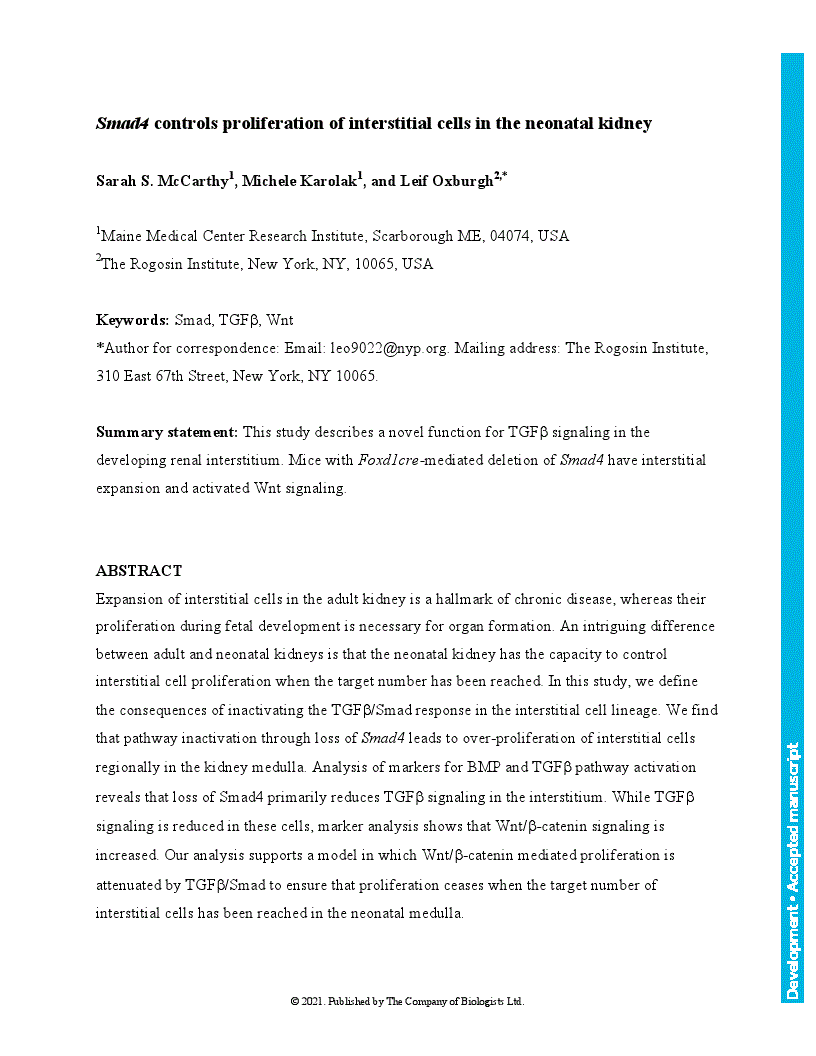Expansion of interstitial cells in the adult kidney is a hallmark of chronic disease, whereas their proliferation during fetal development is necessary for organ formation. An intriguing difference between adult and neonatal kidneys is that the neonatal kidney has the capacity to control interstitial cell proliferation when the target number has been reached. In this study, we define the consequences of inactivating the TGFβ/Smad response in the interstitial cell lineage. We find that pathway inactivation through loss of Smad4 leads to over-proliferation of interstitial cells regionally in the kidney medulla. Analysis of markers for BMP and TGFβ pathway activation reveals that loss of Smad4 primarily reduces TGFβ signaling in the interstitium. While TGFβ signaling is reduced in these cells, marker analysis shows that Wnt/β-catenin signaling is increased. Our analysis supports a model in which Wnt/β-catenin mediated proliferation is attenuated by TGFβ/Smad to ensure that proliferation ceases when the target number of interstitial cells has been reached in the neonatal medulla.
Smad4 controls proliferation of interstitial cells in the neonatal kidney
- Award Group:
- Funder(s): National Institutes of Health
- Award Id(s): R24DK106743
- Funder(s):
Currently Viewing Accepted Manuscript - Newer Version Available
- Split-screen
- Views Icon Views
- Open the PDF for in another window
-
Article Versions Icon
Versions
- Version of Record 04 January 2022
- Accepted Manuscript 08 December 2021
- Share Icon Share
-
Tools Icon
Tools
- Search Site
Sarah S. McCarthy, Michele Karolak, Leif Oxburgh; Smad4 controls proliferation of interstitial cells in the neonatal kidney. Development 2021; dev.199984. doi: https://doi.org/10.1242/dev.199984
Download citation file:
Advertisement
Call for papers: Uncovering Developmental Diversity

Development invites you to submit your latest research to our upcoming special issue: Uncovering Developmental Diversity. This issue will be coordinated by our academic Editor Cassandra Extavour (Harvard University, USA) alongside two Guest Editors: Liam Dolan (Gregor Mendel Institute of Molecular Plant Biology, Austria) and Karen Sears (University of California Los Angeles, USA).
Choose Development in 2024

In this Editorial, Development Editor-in-Chief James Briscoe and Executive Editor Katherine Brown explain how you support your community by publishing in Development and how the journal champions serious science, community connections and progressive publishing.
Journal Meeting: From Stem Cells to Human Development

Register now for the 2024 Development Journal Meeting From Stem Cells to Human Development. Early-bird registration deadline: 3 May. Abstract submission deadline: 21 June.
Pluripotency of a founding field: rebranding developmental biology

This collaborative Perspective, the result of a workshop held in 2023, proposes a set of community actions to increase the visibility of the developmental biology field. The authors make recommendations for new funding streams, frameworks for collaborations and mechanisms by which members of the community can promote themselves and their research.
Read & Publish Open Access publishing: what authors say

We have had great feedback from authors who have benefitted from our Read & Publish agreement with their institution and have been able to publish Open Access with us without paying an APC. Read what they had to say.



